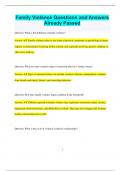Family Violence Questions and Answers
Already Passed
Question: What is the definition of family violence?
Answer: ✔✔ Family violence refers to any form of physical, emotional, or psychological abuse,
neglect, or mistreatment occurring within a family unit, typically involving spouses, children, or
other close relatives.
Question: What are some common signs of emotional abuse in a family setting?
Answer: ✔✔ Signs of emotional abuse can include constant criticism, manipulation, isolation
from friends and family, threats, and controlling behavior.
Question: How does family violence impact children in the household?
Answer: ✔✔ Children exposed to family violence may experience emotional trauma, anxiety,
depression, behavioral issues, and difficulties in school. They may also struggle with forming
healthy relationships later in life.
Question: What is the cycle of violence in abusive relationships?
1
,Answer: ✔✔ The cycle of violence typically includes a tension-building phase, an abusive
incident, and a honeymoon phase where the abuser may apologize and promise change. This
cycle often repeats and can escalate over time.
Question: What legal measures can be taken to protect victims of family violence?
Answer: ✔✔ Legal measures may include restraining orders, protective orders, and the
involvement of law enforcement to remove the abuser from the home. Victims can also seek
legal aid to pursue custody or divorce proceedings.
Question: How does domestic violence differ from family violence?
Answer: ✔✔ Domestic violence specifically refers to abuse between intimate partners, such as
spouses or cohabiting partners, while family violence encompasses a broader range of
relationships within the family unit, including abuse between siblings, parents, and children.
Question: What role do community support services play in addressing family violence?
Answer: ✔✔ Community support services provide victims with resources such as counseling,
shelter, legal assistance, and advocacy. They play a crucial role in helping victims escape
abusive situations and rebuild their lives.
Question: How can friends and family support a victim of family violence?
2
,Answer: ✔✔ Friends and family can offer emotional support, listen without judgment, help the
victim create a safety plan, encourage them to seek professional help, and provide information
about available resources and services.
Question: What are some long-term effects of family violence on survivors?
Answer: ✔✔ Long-term effects can include chronic health issues, PTSD, substance abuse,
difficulty in forming trust-based relationships, and ongoing emotional and psychological
challenges.
Question: How can society as a whole work to prevent family violence?
Answer: ✔✔ Society can work to prevent family violence through public awareness campaigns,
education on healthy relationships, supporting legislation that protects victims, and providing
funding for shelters and support services.
1 in 3 female homicide victims are __________ by their current or former partner every year
Murdered
More than 4 million women experience ______________ by their partners
Physical assault and rape
More than 3 million __________ witness domestic violence in their homes every year
3
, Children
There is a ________% higher rate of children suffering abuse or neglect if they live in homes
where there is domestic violence
30-60
Domestic violence costs more than __________a year in law enforcement involvement, legal
work, medical and mental health treatment, and lost productivity
$37 billion
While family violence can happen to anyone, regardless of gender, race, ethnicity, sexual
orientation, or income the sobering fact is that ______women will experience domestic violence
during her lifetime.
1 in 4
Healthy relationships are made up of:
-Respect
-Honesty
-Trust
-Communication
A healthy relationship is a partnership that still allows each party to maintain their independence
and ability to make decisions
Healthy relationships are based upon:
4




